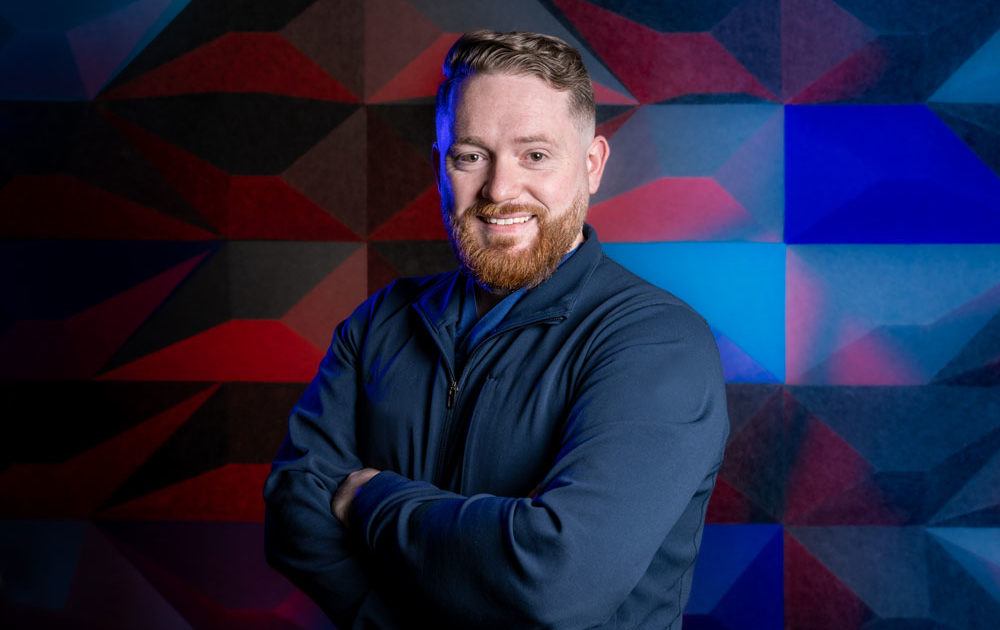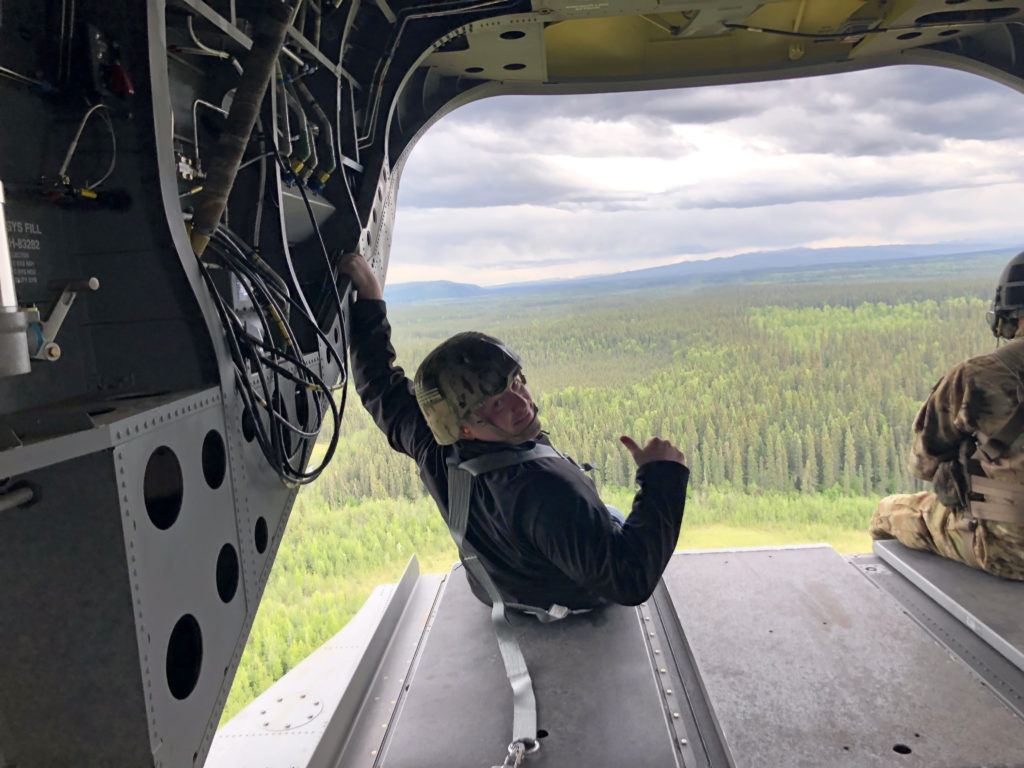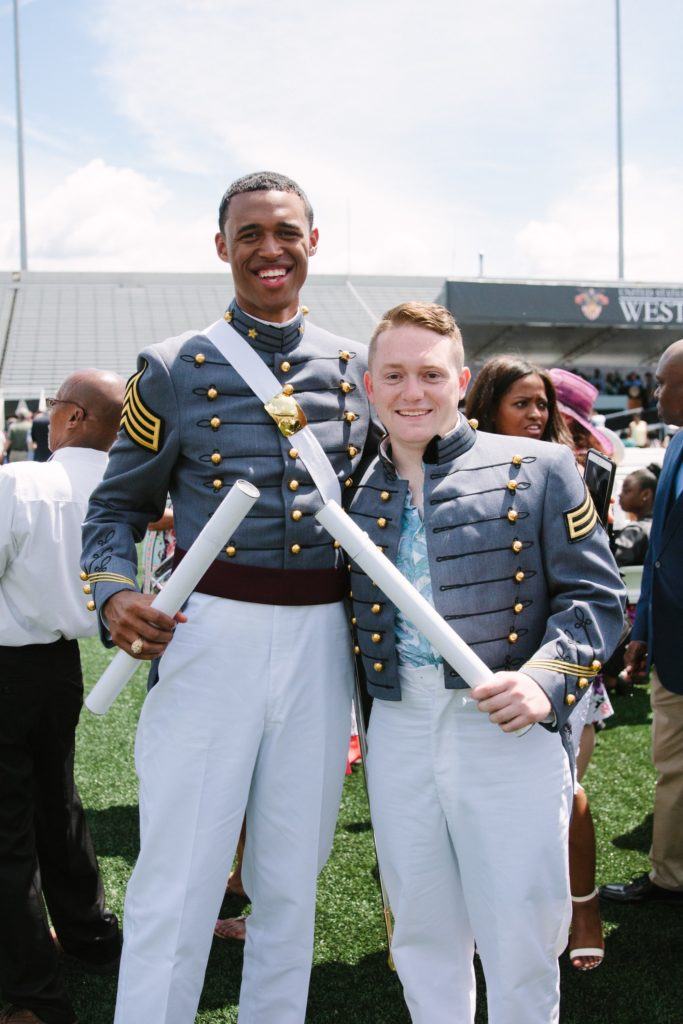
Honoring Our Veterans: Luke O’Neill, Neurosurgery Research Coordinator
As the son of two doctors, neurosurgery clinical research coordinator Luke O’Neill developed an interest in medicine at an early age. But it was an experience in the United States Army that drew him to the neurosciences.
Luke was overseeing a unit in Alaska as first lieutenant when one of his soldiers sustained a second traumatic brain injury. The soldier had recovered well from his initial injury, caused by an improvised explosive device (IED) which he encountered in Iraq. However, he began to show signs of cognitive impairment after the second incident.
“We’d ask him to read the serial number off of a radio, and he’d pick it up, look at it, and say: What was I supposed to do with this?” Luke recalled.
The soldier worried about what his future would hold. Would he have to leave the Army? Would he be able to maintain a civilian job? How would he provide for his three children?
Committed to supporting his soldier through the recovery process, Luke sought to expand his own knowledge of traumatic brain injuries. The more he learned about neurotrauma, the more fascinated he became with the brain and spine.
Soon thereafter, Luke found himself medically retired from the Army. Repeated injuries to his shoulders left him considering his next career move earlier than expected.
“I had always wanted to go to medical school, but the plan was to finish serving and then enter medicine,” he said. “That timeline was shifted when I went from going to Iraq to living in Phoenix in the span of a few months.”
Luke applied to numerous laboratories in Phoenix to gain experience in the health sciences. He crossed his fingers that Barrow Neurological Institute would give him a chance to further explore his newfound interest in the neurosciences.
Brian Kelly, PhD, a spinal biomechanics researcher at the Institute, brought Luke onto his team in the summer of 2019—first as a volunteer and then as a student intern. Simultaneously, Luke completed his pre-medicine coursework at Arizona State University.
In January of this year, Luke accepted Dr. Juan Uribe’s offer to coordinate clinical research in the burgeoning Sonntag Spine Center at Barrow.
Answering a Call to Service
Luke embarked on his military career after completing high school in Phoenix, answering what felt like a call to service and following in his older brother’s footsteps.
“I think a lot of it was seeing the person my brother became from the structure in the military,” Luke remembered.
He also felt intrigued by the travel opportunities that the military affords, and he admired the palpable camaraderie among service members.
Luke studied nuclear engineering at the United States Military Academy at West Point. He graduated in 2017 as an artillery officer, a position that largely entails battlefield management. Before his two years of service in Alaska, he was stationed in Oklahoma for about nine months.
As an officer, Luke supported his soldiers through various challenges on and off the job. At only 22 years old, he found himself having difficult conversations with service members about their financial stress, marital issues, and substance abuse struggles.
“It definitely made me mature a lot faster,” he said. “It also gave me a unique worldview in understanding that despite our different backgrounds, we were on the same team.”
Bridging Career Paths
The camaraderie he experienced in the Army parallels the teamwork involved in neurosurgery, Luke said. His military service also prepared him for working alongside a forward-thinking leader like Dr. Uribe, the Chief of the Division of Spinal Disorders and the Sonntag Chair of Spine Research at Barrow.
“Having a brigade commander or battalion commander who is always thinking 10 steps ahead, you have to be thinking 20 steps ahead as a lieutenant,” he said. “You have to know what questions they’re about to ask and already have answers prepped for them.”
Luke is an invaluable asset to our team and is instrumental in our ability to continually influence patient care on a global scale. I believe his leadership, work ethic, and attention to detail are attributes honed by his military service, and they are implemented daily in his work here at the Sonntag Spine Center.
Juan Uribe, MD, Chief of Division of Spinal Disorders & Sonntag Chair of Spine Research
As a research coordinator, Luke manages sponsor studies at the Institute. This includes screening patients for eligibility, handling the informed consent and enrollment process, and following participants throughout the studies. He is also building the clinical outcomes database for spine research.
However, his role has grown to encompass work on manuscripts for peer-reviewed journals, support for the residents’ research projects, appearances at conferences, and generally serving as Dr. Uribe’s “right-hand man” for anything related to spine research.
“Luke is an invaluable asset to our team and is instrumental in our ability to continually influence patient care on a global scale,” Dr. Uribe said. “I believe his leadership, work ethic, and attention to detail are attributes honed by his military service, and they are implemented daily in his work here at the Sonntag Spine Center.”
Looking Ahead
Luke’s days can be taxing, often amounting to 13 hours on the clock. He feels fortunate when he pauses to look around, though.
“I’m constantly surrounded by high-achieving individuals who are always pushing the envelope,” he said.
Luke also takes pride in being part of the inception and growth of the Sonntag Spine Center. Founded with the mission to advance the treatment of spinal disorders, the Center equips researchers with state-of-the-art resources and encourages multidisciplinary collaboration.
Luke is still eyeing medical school and is excited to explore all specialties, but he hasn’t settled on a firm timeline just yet.
“It was continually walking through the next door that was opened for me that I found myself heavily invested in this spine world, and I’ve since fallen in love with it,” he said. “I’m open to the next door that’s open for me within medicine, but I’m in no rush to leave Barrow.”


